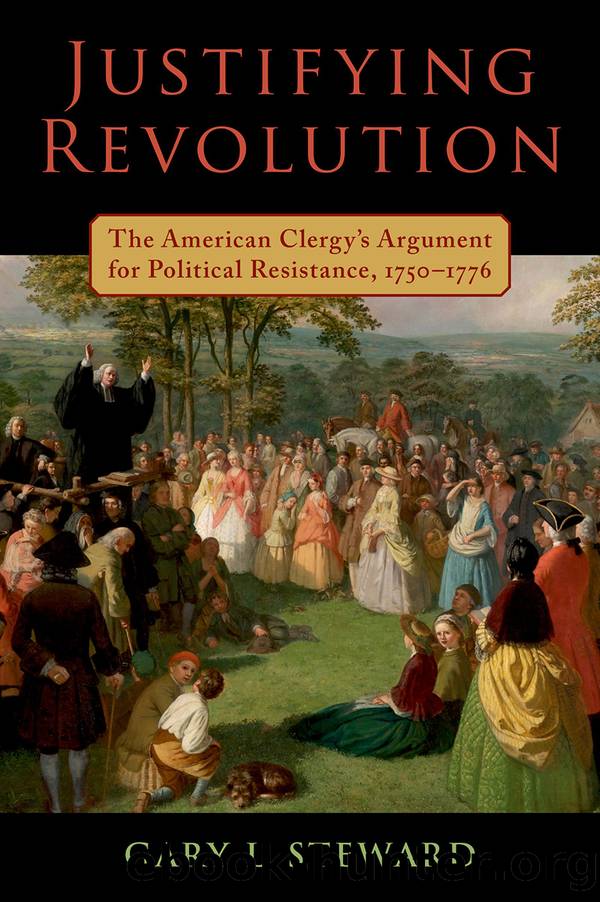Justifying Revolution by Gary L. Steward

Author:Gary L. Steward
Language: eng
Format: epub
Publisher: Oxford University Press
Published: 2021-09-15T00:00:00+00:00
The Shift to Independence
The year 1776 was the pivotal year in which colonists began arguing openly for American independence. The American clergy began publicly floating the idea of independence that year as well, although so many had explicitly rejected this in writing the year before. The clergy moved in this direction not because of any philosophical or theological shift on their part, but because of practical considerations. By this time, colonial resistance had taken the form of a defensive war and the estrangement from the British government that many felt was at its peak.
One of the first clergymen to publicly support the idea of American independence was Jacob Green. Green served as a long-standing Presbyterian pastor in Morristown, New Jersey, and also as an interim president of the College of New Jersey in Princeton after the death of Jonathan Edwards. His son, Ashbel Green, would later serve as president of the college and was also one of the key founders of Princeton Theological Seminary. Green was a New-Side Presbyterian committed to both confessional orthodoxy and the promotion of evangelical religious experience. He was also an early advocate of American independence.20 In 1776 Green published a pamphlet entitled Observations on the Reconciliation of Great Britain and the Colonies, in which he sought to remove objections to American independence and encouraged the colonists to thoughtfully consider it. Green published his pamphlet because the choice of âreconciliation or a proper separationâ from Great Britain was by this time âmuch in the thoughts of the Americans.â21 The colonists were already discussing the question of reconciliation or independence, and Green believed that both sides of the matter should be discussed openly: âThese matters are now exercising the thoughts of many among us. Americaâs reconciliation with Britain is become a subject of conversation, and I think ought to be impartially canvassed.â22
While Green called for the question of independence to be discussed dispassionately and âwith calmness, temper, and sound reasoning,â he clearly favored American independence. Greenâs stance in favor of separation from Britain was unusual for a clergyman in the early part of 1776. According to William Sprague, Greenâs pamphlet showed the âreasonableness and necessityâ of American independence âat a period when such an opinion was very extensively branded as a political heresy.â23 Even so, Green argued that Great Britain had forfeited its right to political submission and dependence when it failed to protect and defend the colonistsâ legal rights and liberties and instead turned against them as their enemy. Green listed a number of hypothetical examples whereby Britain would clearly forfeit its right to American submission and then presented a situation for consideration that was much like the one the colonies were actually in. In this way, he made his rhetorically softened case for independence:
Suppose . . . Britain herself should act the part of an enemy, refuses us the privileges which are ours by constitution, seize our properties, and deprive us our mutual rights; in which case America expostulates, pleads, submits to all equitable impositions
Download
This site does not store any files on its server. We only index and link to content provided by other sites. Please contact the content providers to delete copyright contents if any and email us, we'll remove relevant links or contents immediately.
The Lost Art of Listening by Michael P. Nichols(7506)
Why I Am Not A Calvinist by Dr. Peter S. Ruckman(4153)
The Rosicrucians by Christopher McIntosh(3519)
Wicca: a guide for the solitary practitioner by Scott Cunningham(3178)
Signature in the Cell: DNA and the Evidence for Intelligent Design by Stephen C. Meyer(3138)
Real Sex by Lauren F. Winner(3022)
The Holy Spirit by Billy Graham(2952)
To Light a Sacred Flame by Silver RavenWolf(2823)
The End of Faith by Sam Harris(2742)
The Gnostic Gospels by Pagels Elaine(2531)
Waking Up by Sam Harris(2460)
Nine Parts of Desire by Geraldine Brooks(2369)
Jesus by Paul Johnson(2362)
Devil, The by Almond Philip C(2331)
The God delusion by Richard Dawkins(2309)
Heavens on Earth by Michael Shermer(2284)
Kundalini by Gopi Krishna(2184)
Chosen by God by R. C. Sproul(2164)
The Nature of Consciousness by Rupert Spira(2108)
